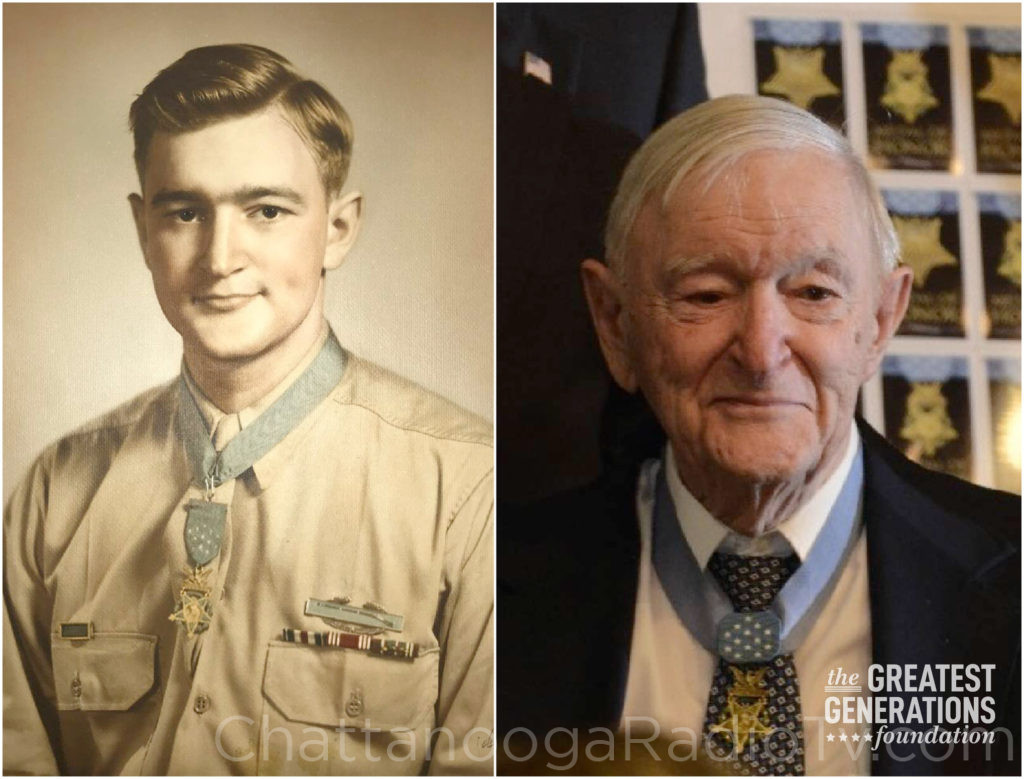He was Chattanooga’s hero of World War II. He was a symbol for all of the heroic sacrifices of the city’s service men and women. He was Tennessee’s bravest man, who refused to surrender.
Imagine hearing yourself described like that for the last 75 years of your life. Everywhere you go, everyone you meet is in awe of you. They call their children over. “Kids, meet a true American hero. If not for him, and others like him, we would not enjoy the freedoms we have today.”
Hero. Patriot. Role model. Defender of freedom. A man who displayed unmatched courage in a time of almost certain death.
Those are not Charles Coolidge’s words. He was humble to a fault. But he was undeniably proud of his place in our city’s history, and that of our nation.
Charles Coolidge got his final promotion last week, the one he had awaited during a remarkably long lifetime. Just four months shy of his 100th birthday, the old soldier received his ultimate reward.
The praise that he received from his peers in the military, from journalists, and from those who admired him was hard earned.
The shy young man who had been described as the best rock-thrower in the neighborhood, blossomed into a leader of men. At the age of 23, he found himself, unexpectedly as the senior enlisted man, leading a group of young recruits against a German infantry. Coolidge’s troops were outnumbered four to one.
It was in France, on October 24, 1944, and the standoff would continue for three days. Despite a German commander’s demands for the Americans to stand down, Coolidge would not surrender. Calling it self-preservation, Coolidge led his band of 30 soldiers, and he wouldn’t back down. “Come and get me,” he said. He dodged German tanks, hiding behind tree trunks, tossing hand grenades along the way. Coolidge and his men killed 26 enemy soldiers, wounding 60 others. Coolidge was the first to approach the Germans, and the last to leave.
Ten months later, he received a hero’s welcome at a packed Soldiers and Sailors Memorial Auditorium. It was Charles Coolidge Day in Chattanooga honoring the city’s only Medal of Honor recipient. Tennessee’s Governor, United States Senators, and a stage full of military leaders paid tribute. The newspapers were full of ads from businesses letting their customers know they would be closed that day, so their employees and customers could attend. Those who were unable to find a seat in the auditorium greeted Coolidge from the street as he arrived at the head of a parade.
We still celebrate him every day, at the park and the highway named in his honor. Had fate not intervened, he would have been perfectly happy as an anonymous book binder at his family’s printing company, still in business, 111 years after its founding.
Instead, he became a larger than life symbol of heroism, courage, and patriotism. His post-war life would not be easy. In his forties, he was diagnosed with multiple sclerosis (MS), the chronic, mysterious disease that attacks the central nervous system. There is no known cure, and he was never able to regain his mobility.
For a fighter like Coolidge, MS was yet another inferior opponent. To say that it didn’t stop him from leading a normal life is a massive understatement. He continued working until his retirement in 2005, at the age of 84. He made daily visits to his office as long as he was able to do so, until the age of 95. When he wasn’t running his business, he was raising a family, and active in his community. He never ran for office, despite the fact that his name alone would carry most any election. Instead, he worked behind the scenes. He and his wife Frances were among the earliest advocates for cleaning up Chattanooga’s air pollution problem, which gave the city a bad name in the 1960s. That issue was addressed thanks in part to a strong push from Charles Coolidge.
Chattanooga’s Charles H. Coolidge Medal of Honor Heritage Center stands as a lasting tribute, sharing his story with those who remember the sacrifices of the greatest generation, and those who are too young to recall a nation truly united in its quest for freedom. Thankfully our children are learning that “Coolidge” is more than just the name of a park.
He will be laid to rest later this week at the Chattanooga National Military Cemetery alongside his late wife.
Charles Coolidge’s long life surprised no one more than himself. He never forgot staring down near certain death in France, and throughout two years of constant danger. Speaking to hundreds of clubs and civic organizations, he always said he was lucky to be alive. Maybe so, but we are really the lucky ones.



